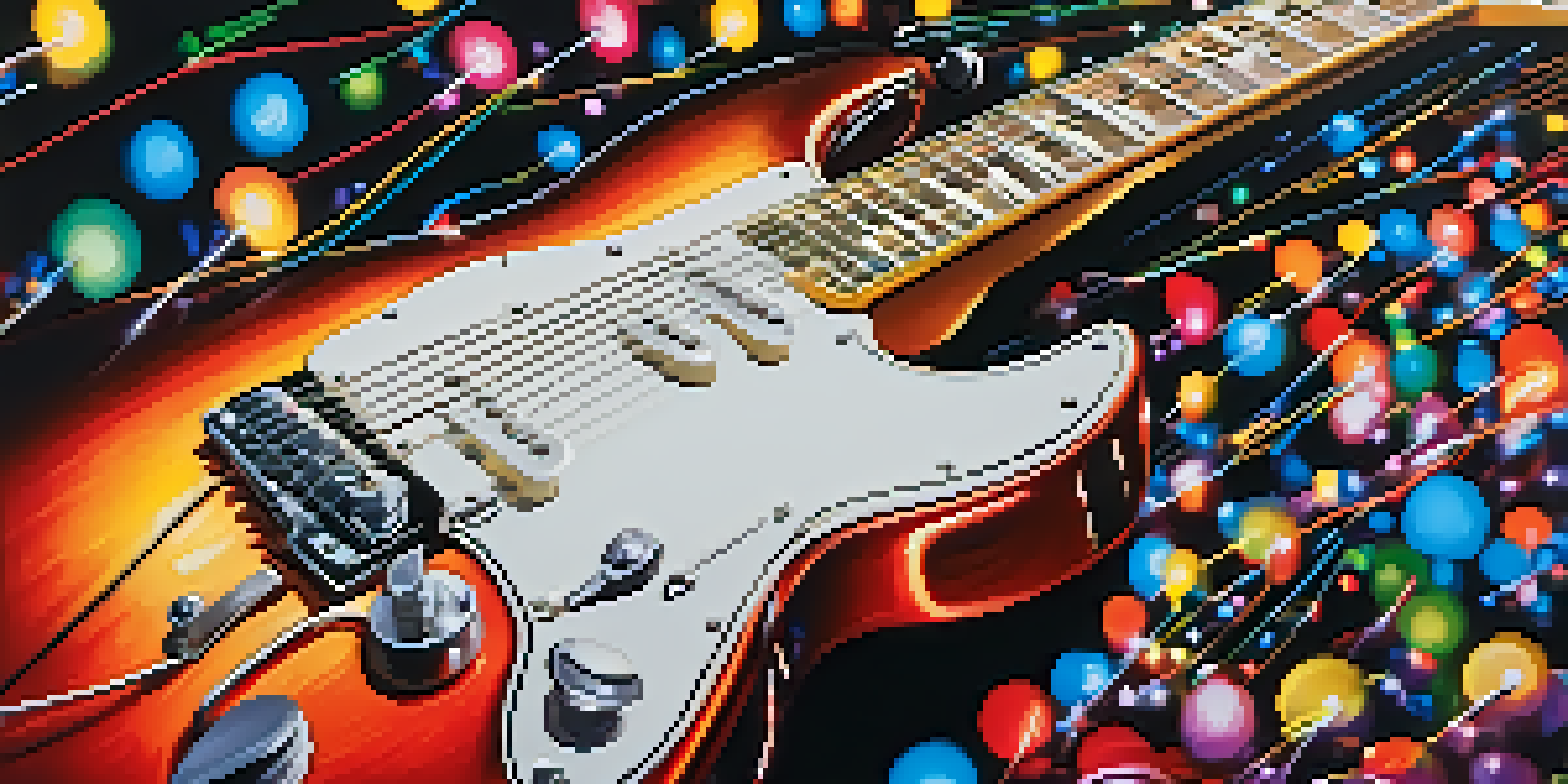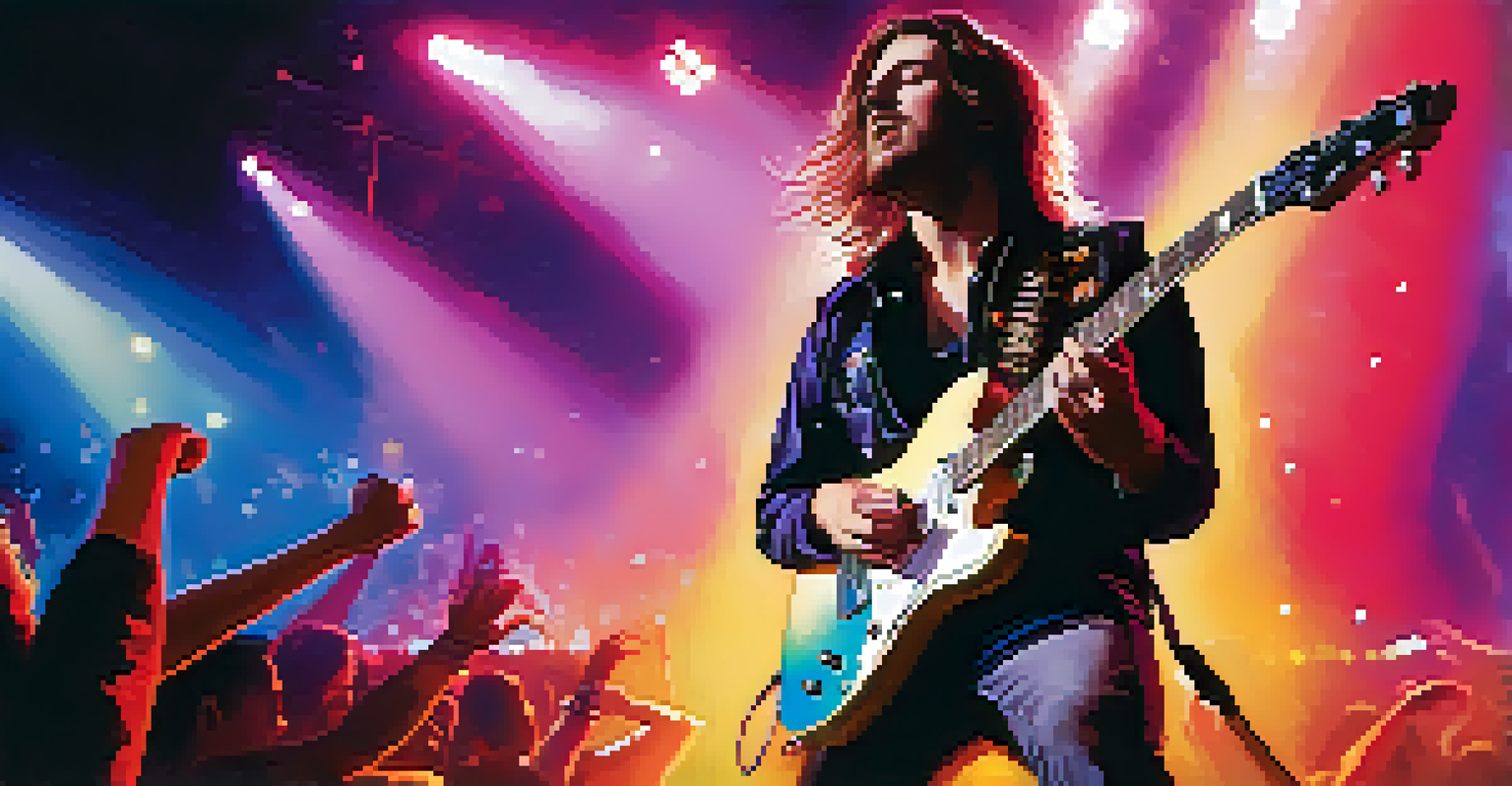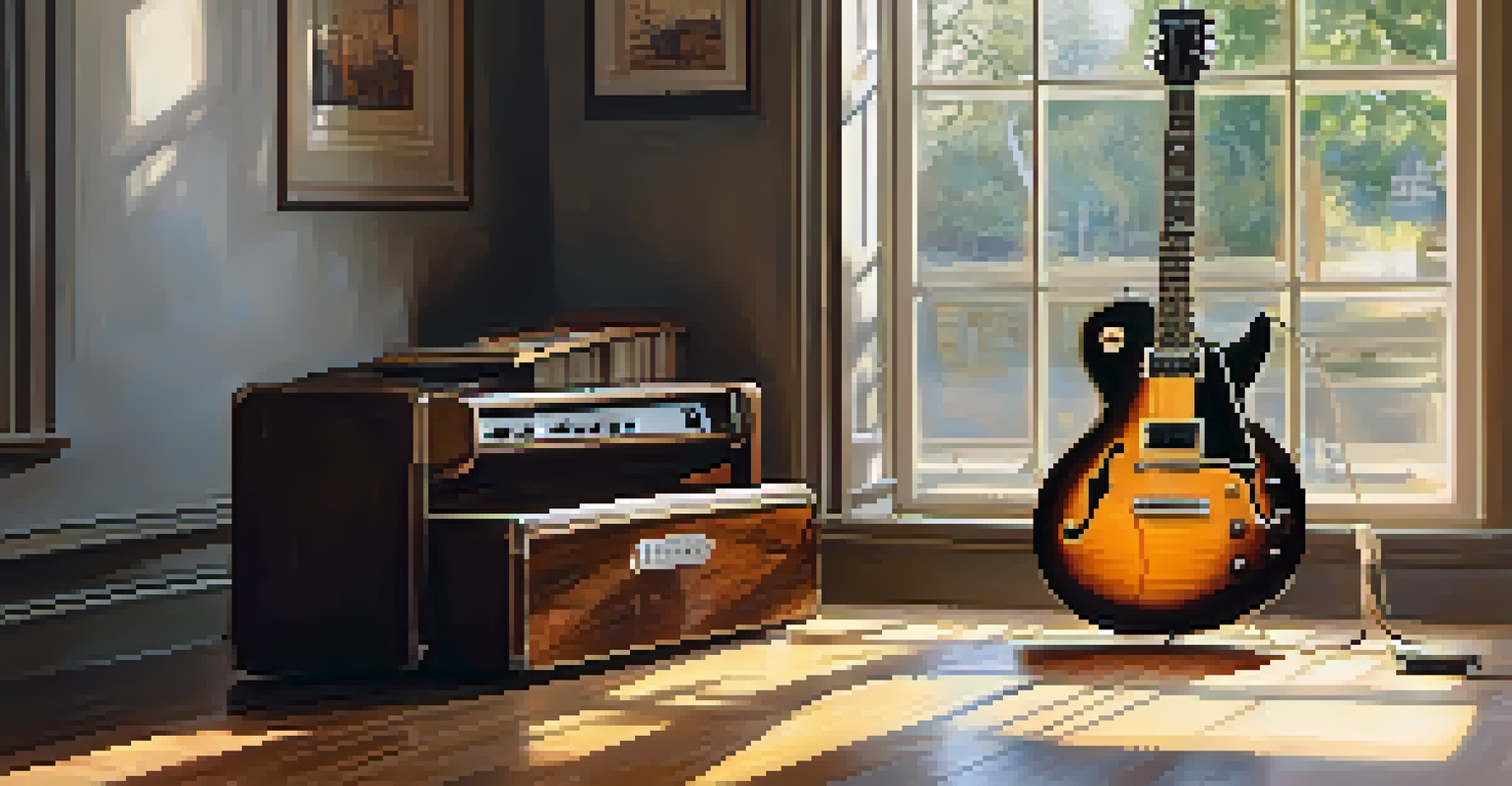Electric Guitars: Backbone of Modern Pop Music Bands Today

The Rise of Electric Guitars in Pop Music
Electric guitars have surged in popularity since their invention, becoming a staple in pop music. In the mid-20th century, artists like Chuck Berry and Elvis Presley showcased the guitar's potential, shaping the genre's sound. Today, these instruments are critical to crafting catchy melodies and powerful riffs that define modern pop hits.
The electric guitar is a symbol of freedom and creativity, allowing musicians to express their true selves.
The electric guitar's unique tonal qualities allow musicians to experiment with various sounds, from clean and bright to gritty and distorted. This versatility has made it an essential tool for songwriters and producers looking to create memorable tracks. As a result, the electric guitar has solidified its place as a crucial element in pop music's evolution.
Furthermore, the visual appeal of electric guitars contributes to their popularity. Iconic guitarists often become symbols of their bands, influencing fashion and culture. This blend of sound and style ensures that the electric guitar remains at the forefront of pop music.
Key Features that Enhance Performance
Electric guitars offer a range of features that enhance musical performance, making them ideal for pop music. The ability to manipulate sound through effects pedals allows artists to create unique sonic textures. From reverb to distortion, these effects can transform a simple chord progression into an unforgettable anthem.

Additionally, the ergonomic design of electric guitars provides comfort and ease of play. With various shapes and sizes, musicians can choose an instrument that fits their style, whether they prefer a sleek Stratocaster or a powerful Les Paul. This accessibility encourages more artists to pick up the electric guitar and explore their musical creativity.
Electric Guitars Shape Pop Music
The electric guitar has become a fundamental element in pop music, influencing sound and style since the mid-20th century.
Moreover, advancements in technology have led to innovations like built-in tuners and customizable pickups. These features not only improve sound quality but also simplify the playing experience. As a result, electric guitars continue to evolve, making them indispensable in today’s pop music landscape.
Influential Bands and Their Signature Sounds
Many of today’s most successful pop bands rely heavily on electric guitars to create their signature sounds. Groups like Coldplay and Maroon 5 have integrated guitar melodies into their music, enhancing emotional depth and catchiness. The electric guitar serves as a backbone for many of their hits, often driving the song's narrative forward.
The beauty of the electric guitar lies in its ability to connect generations of musicians through the power of music.
Similarly, bands like Paramore and The 1975 have pushed the boundaries of pop music by blending genres, all anchored by electric guitar riffs that resonate with fans. Their innovative use of the instrument influences aspiring musicians, showing them the endless possibilities electric guitars offer. This trend has sparked a resurgence of guitar-driven pop music, attracting new listeners and keeping the genre fresh.
Additionally, collaborations between pop artists and renowned guitarists have further solidified the electric guitar's role in modern music. These partnerships create a fusion of styles that captivates audiences, proving that the electric guitar is more than just an instrument—it's a bridge between different musical worlds.
Electric Guitars in Live Performances
The electric guitar is a crowd favorite during live performances, energizing audiences and creating unforgettable moments. Iconic guitar solos often serve as high points in concerts, drawing cheers and applause. Artists like Ed Sheeran and Taylor Swift showcase their guitar skills, captivating fans with their musicianship and stage presence.
Furthermore, the visual spectacle of guitar playing adds to the overall concert experience. Musicians often engage in thrilling displays of skill, further enhancing the connection between them and the audience. This interaction transforms a simple performance into a memorable event that fans will cherish for years.
Technology Enhances Guitar Creativity
Advancements in technology have transformed electric guitars, enabling musicians to experiment with new sounds and improve their performances.
In addition to their showmanship, electric guitars enable artists to create a fuller sound during live shows. With the help of backing tracks and skilled musicians, they can replicate the studio sound while still delivering a raw, live energy. This balance keeps fans returning for more, reinforcing the electric guitar's vital role in pop music performances.
The Impact of Technology on Electric Guitars
Technology has played a significant role in the evolution of electric guitars and their place in pop music. Digital audio workstations (DAWs) and recording software have made it easier for musicians to produce high-quality tracks from home. As a result, aspiring artists can experiment with their sound using electric guitars without needing access to a professional studio.
Moreover, online platforms have democratized music distribution, allowing independent musicians to share their guitar-driven songs with a global audience. This shift has led to a resurgence of guitar-centric pop music, as emerging artists draw inspiration from iconic guitarists. The electric guitar thus serves as a bridge between generations of musicians, connecting the past with the present.
Additionally, innovative guitar technology, such as MIDI-enabled guitars and smartphone apps, has expanded creative possibilities. These advancements not only enhance the instrument's versatility but also encourage musicians to push their boundaries. As technology continues to evolve, so too does the role of electric guitars in shaping the future of pop music.
The Cultural Significance of Electric Guitars
Electric guitars hold a significant place in pop culture, symbolizing freedom and creativity. They have become synonymous with rebellion and self-expression, inspiring countless musicians to pursue their passions. From Jimi Hendrix to Billie Eilish, guitarists have used their instruments to convey powerful messages, resonating with fans on a personal level.
Moreover, electric guitars often serve as a source of nostalgia, evoking memories of iconic concerts and classic albums. This emotional connection keeps the instrument relevant, as new generations discover the rich history behind electric guitar music. The stories and legends surrounding famous guitarists add depth to their appeal, making them cultural icons.
Cultural Impact of Electric Guitars
Electric guitars symbolize freedom and creativity in pop culture, resonating with audiences and inspiring musicians across generations.
In addition, the electric guitar has influenced fashion and lifestyle trends, further embedding it into the fabric of pop culture. From signature guitar styles to clothing choices, the instrument has shaped how artists present themselves. This cultural significance ensures that electric guitars will remain at the forefront of modern music for years to come.
Future of Electric Guitars in Pop Music
As we look ahead, the future of electric guitars in pop music appears bright and full of potential. With the rise of genres like synth-pop and indie rock, guitarists are blending traditional playing styles with new sounds. This fusion creates a fresh take on electric guitar music, attracting diverse audiences and keeping the genre alive.
Furthermore, the resurgence of interest in vintage guitars and analog recording techniques indicates a desire for authenticity in music production. Musicians are increasingly turning to classic instruments to capture a nostalgic sound while still incorporating modern elements. This blend of old and new ensures that electric guitars will continue to play a central role in shaping pop music's future.

Finally, as technology evolves, we can expect even more innovations that will enhance the electric guitar experience. New materials, design techniques, and software will likely emerge, pushing the boundaries of what musicians can achieve. The electric guitar, as a versatile and dynamic instrument, will remain an essential part of the pop music landscape for generations to come.